Learning Styles Questionnaire Analysis and Interpretation
VerifiedAdded on 2022/08/15
|5
|933
|16
Homework Assignment
AI Summary
This assignment presents an analysis of a student's learning style based on the completion and scoring of a Learning Styles Questionnaire. The student identifies their dominant learning styles as Activist and Pragmatist, as defined by Honey and Mumford. The analysis details the characteristics of each learning style, explaining how Activist learners prefer hands-on experiences and group discussions, while Pragmatists seek practical applications and innovative techniques. The student reflects on their personal learning preferences, providing examples of how they apply these styles in their learning experiences. The report also briefly describes the Reflector and Theorist learning styles for a comprehensive understanding of the framework.
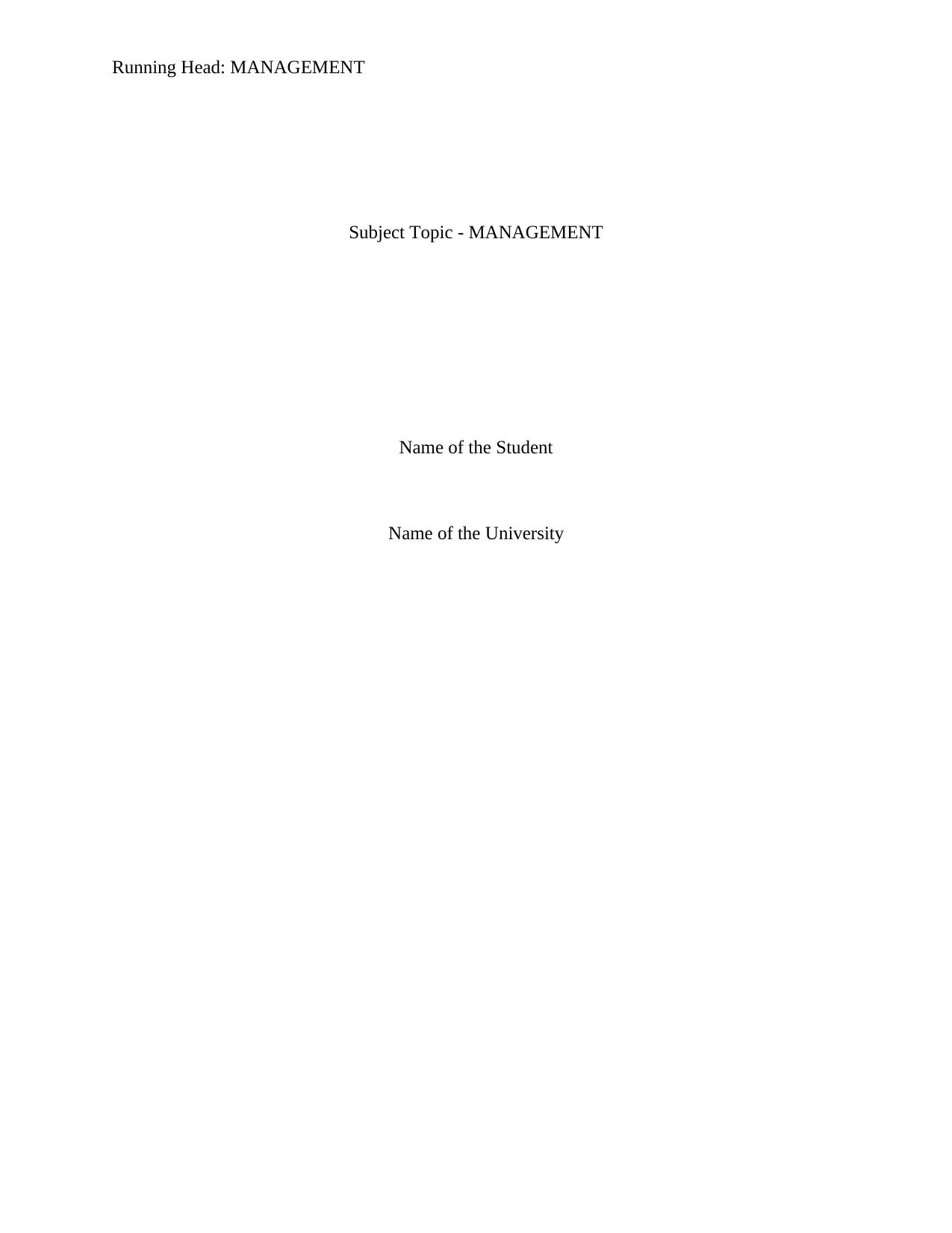
Running Head: MANAGEMENT
Subject Topic - MANAGEMENT
Name of the Student
Name of the University
Subject Topic - MANAGEMENT
Name of the Student
Name of the University
Paraphrase This Document
Need a fresh take? Get an instant paraphrase of this document with our AI Paraphraser
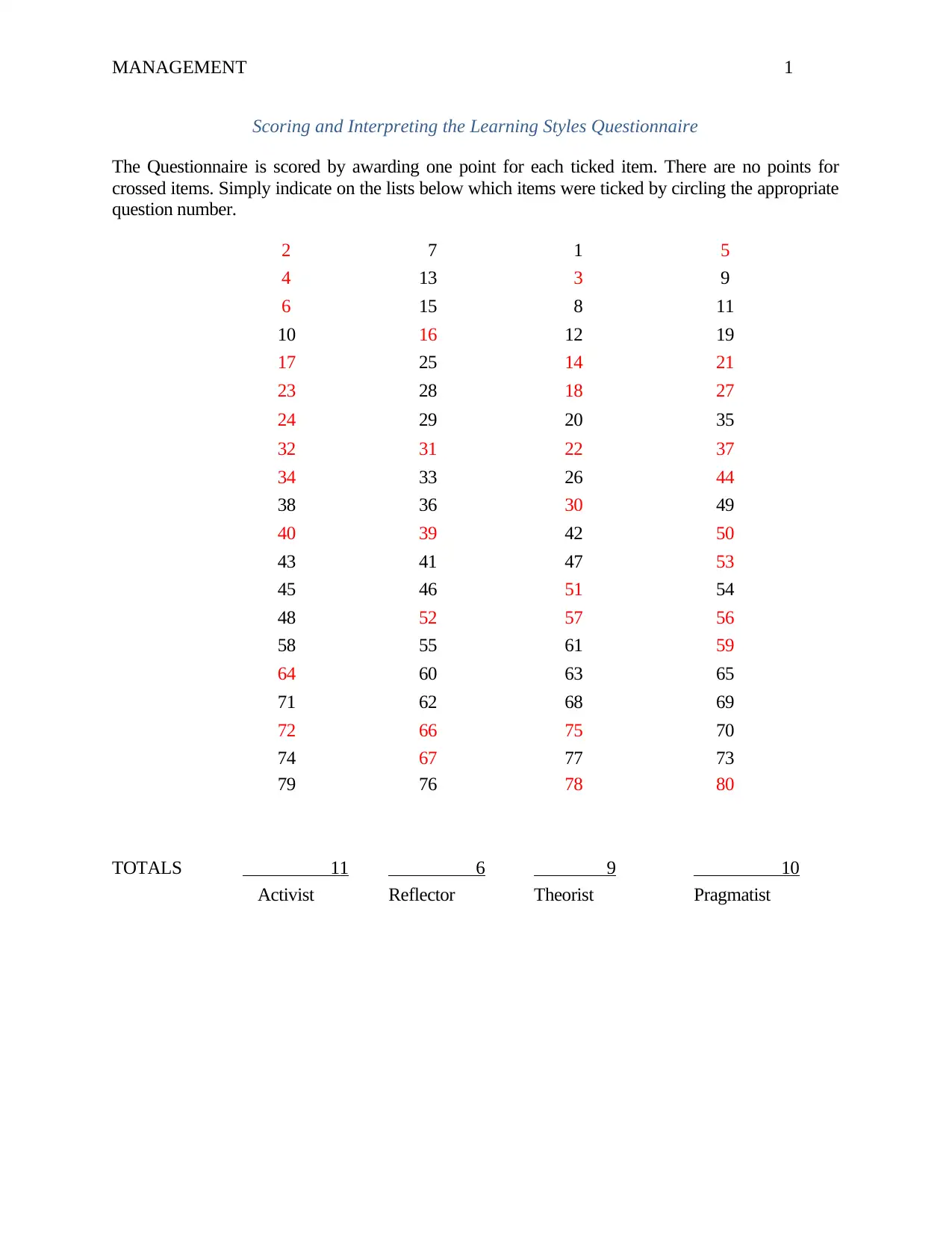
MANAGEMENT 1
Scoring and Interpreting the Learning Styles Questionnaire
The Questionnaire is scored by awarding one point for each ticked item. There are no points for
crossed items. Simply indicate on the lists below which items were ticked by circling the appropriate
question number.
2 7 1 5
4 13 3 9
6 15 8 11
10 16 12 19
17 25 14 21
23 28 18 27
24 29 20 35
32 31 22 37
34 33 26 44
38 36 30 49
40 39 42 50
43 41 47 53
45 46 51 54
48 52 57 56
58 55 61 59
64 60 63 65
71 62 68 69
72 66 75 70
74 67 77 73
79 76 78 80
TOTALS 11 6 9 10
Activist Reflector Theorist Pragmatist
Scoring and Interpreting the Learning Styles Questionnaire
The Questionnaire is scored by awarding one point for each ticked item. There are no points for
crossed items. Simply indicate on the lists below which items were ticked by circling the appropriate
question number.
2 7 1 5
4 13 3 9
6 15 8 11
10 16 12 19
17 25 14 21
23 28 18 27
24 29 20 35
32 31 22 37
34 33 26 44
38 36 30 49
40 39 42 50
43 41 47 53
45 46 51 54
48 52 57 56
58 55 61 59
64 60 63 65
71 62 68 69
72 66 75 70
74 67 77 73
79 76 78 80
TOTALS 11 6 9 10
Activist Reflector Theorist Pragmatist
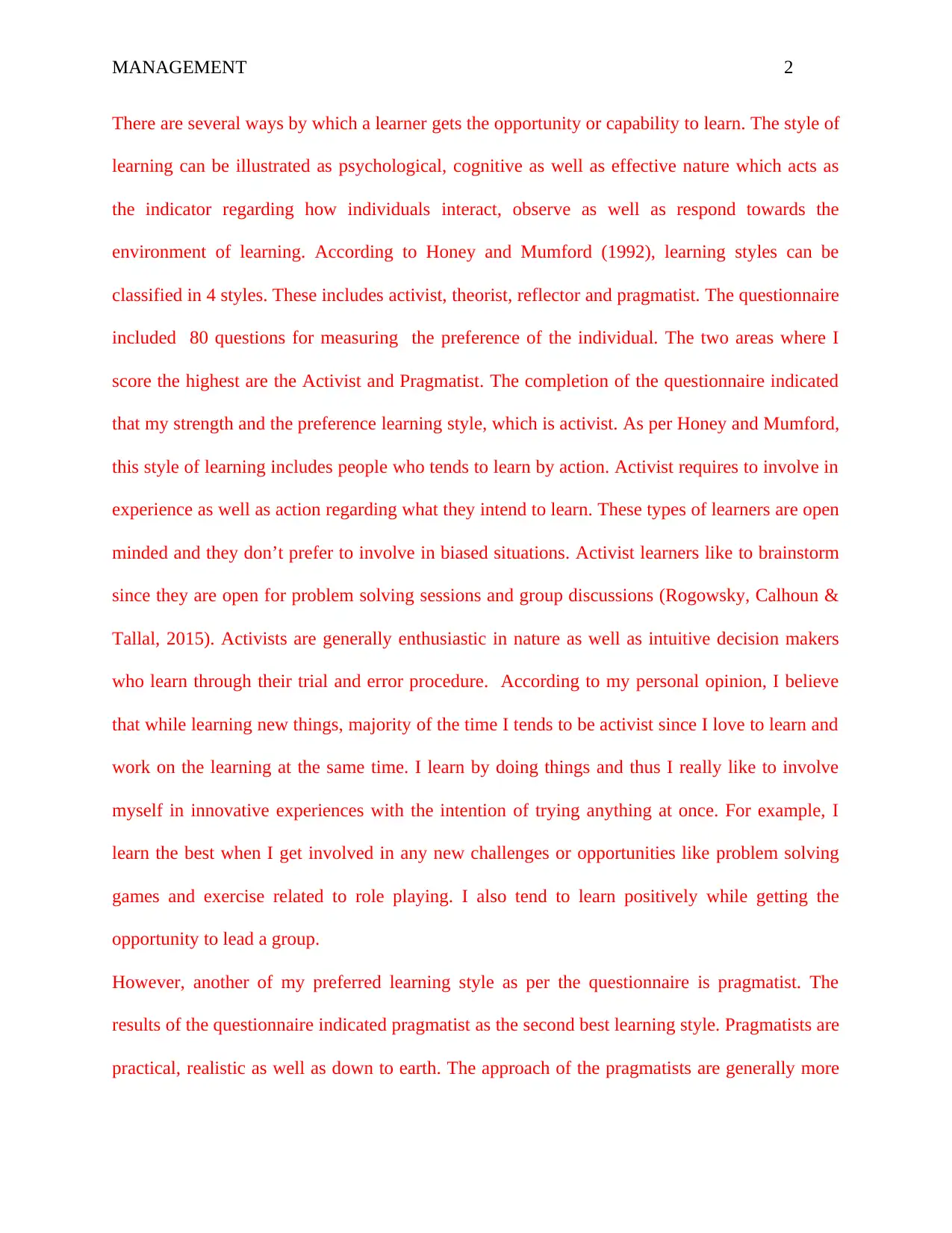
MANAGEMENT 2
There are several ways by which a learner gets the opportunity or capability to learn. The style of
learning can be illustrated as psychological, cognitive as well as effective nature which acts as
the indicator regarding how individuals interact, observe as well as respond towards the
environment of learning. According to Honey and Mumford (1992), learning styles can be
classified in 4 styles. These includes activist, theorist, reflector and pragmatist. The questionnaire
included 80 questions for measuring the preference of the individual. The two areas where I
score the highest are the Activist and Pragmatist. The completion of the questionnaire indicated
that my strength and the preference learning style, which is activist. As per Honey and Mumford,
this style of learning includes people who tends to learn by action. Activist requires to involve in
experience as well as action regarding what they intend to learn. These types of learners are open
minded and they don’t prefer to involve in biased situations. Activist learners like to brainstorm
since they are open for problem solving sessions and group discussions (Rogowsky, Calhoun &
Tallal, 2015). Activists are generally enthusiastic in nature as well as intuitive decision makers
who learn through their trial and error procedure. According to my personal opinion, I believe
that while learning new things, majority of the time I tends to be activist since I love to learn and
work on the learning at the same time. I learn by doing things and thus I really like to involve
myself in innovative experiences with the intention of trying anything at once. For example, I
learn the best when I get involved in any new challenges or opportunities like problem solving
games and exercise related to role playing. I also tend to learn positively while getting the
opportunity to lead a group.
However, another of my preferred learning style as per the questionnaire is pragmatist. The
results of the questionnaire indicated pragmatist as the second best learning style. Pragmatists are
practical, realistic as well as down to earth. The approach of the pragmatists are generally more
There are several ways by which a learner gets the opportunity or capability to learn. The style of
learning can be illustrated as psychological, cognitive as well as effective nature which acts as
the indicator regarding how individuals interact, observe as well as respond towards the
environment of learning. According to Honey and Mumford (1992), learning styles can be
classified in 4 styles. These includes activist, theorist, reflector and pragmatist. The questionnaire
included 80 questions for measuring the preference of the individual. The two areas where I
score the highest are the Activist and Pragmatist. The completion of the questionnaire indicated
that my strength and the preference learning style, which is activist. As per Honey and Mumford,
this style of learning includes people who tends to learn by action. Activist requires to involve in
experience as well as action regarding what they intend to learn. These types of learners are open
minded and they don’t prefer to involve in biased situations. Activist learners like to brainstorm
since they are open for problem solving sessions and group discussions (Rogowsky, Calhoun &
Tallal, 2015). Activists are generally enthusiastic in nature as well as intuitive decision makers
who learn through their trial and error procedure. According to my personal opinion, I believe
that while learning new things, majority of the time I tends to be activist since I love to learn and
work on the learning at the same time. I learn by doing things and thus I really like to involve
myself in innovative experiences with the intention of trying anything at once. For example, I
learn the best when I get involved in any new challenges or opportunities like problem solving
games and exercise related to role playing. I also tend to learn positively while getting the
opportunity to lead a group.
However, another of my preferred learning style as per the questionnaire is pragmatist. The
results of the questionnaire indicated pragmatist as the second best learning style. Pragmatists are
practical, realistic as well as down to earth. The approach of the pragmatists are generally more
⊘ This is a preview!⊘
Do you want full access?
Subscribe today to unlock all pages.

Trusted by 1+ million students worldwide
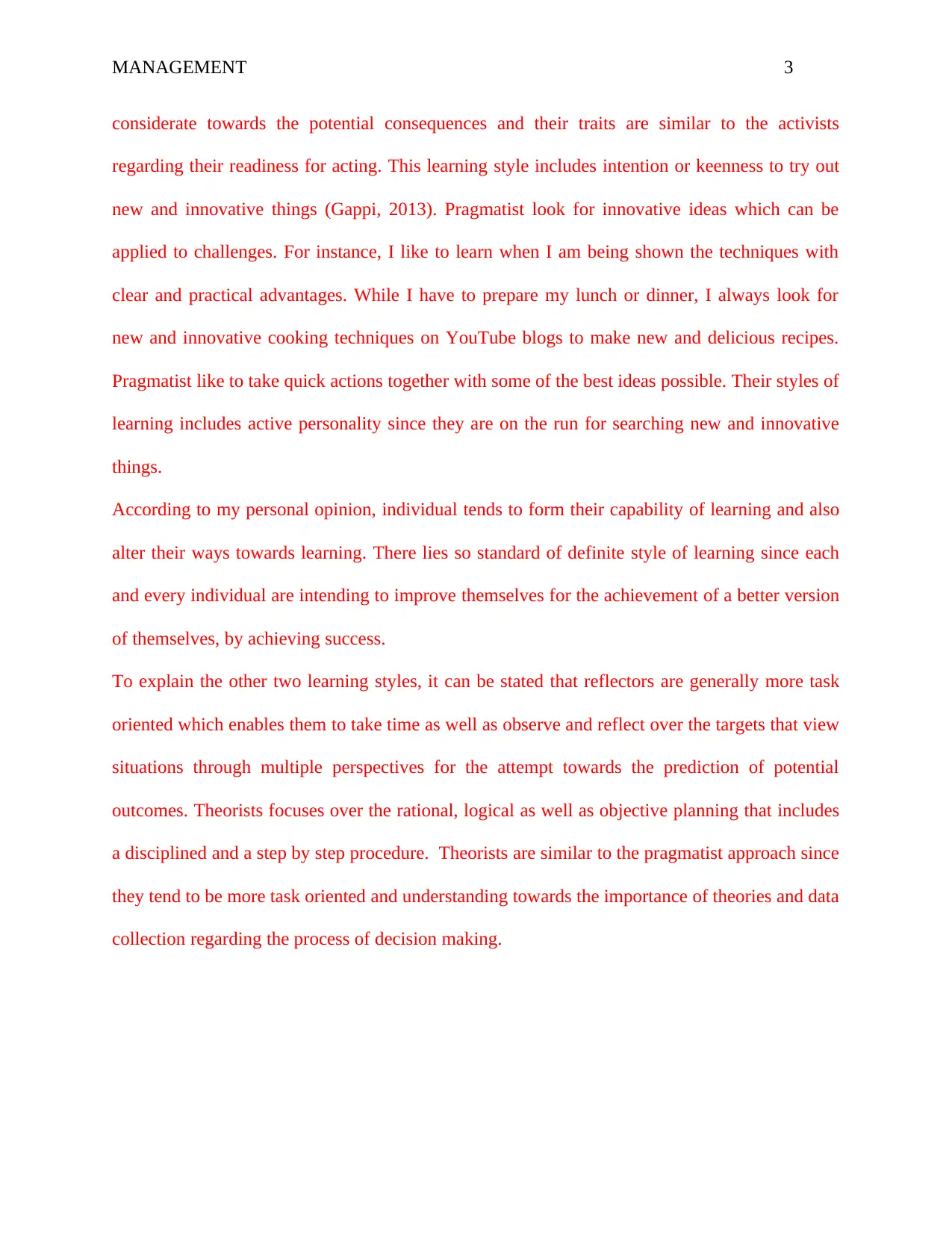
MANAGEMENT 3
considerate towards the potential consequences and their traits are similar to the activists
regarding their readiness for acting. This learning style includes intention or keenness to try out
new and innovative things (Gappi, 2013). Pragmatist look for innovative ideas which can be
applied to challenges. For instance, I like to learn when I am being shown the techniques with
clear and practical advantages. While I have to prepare my lunch or dinner, I always look for
new and innovative cooking techniques on YouTube blogs to make new and delicious recipes.
Pragmatist like to take quick actions together with some of the best ideas possible. Their styles of
learning includes active personality since they are on the run for searching new and innovative
things.
According to my personal opinion, individual tends to form their capability of learning and also
alter their ways towards learning. There lies so standard of definite style of learning since each
and every individual are intending to improve themselves for the achievement of a better version
of themselves, by achieving success.
To explain the other two learning styles, it can be stated that reflectors are generally more task
oriented which enables them to take time as well as observe and reflect over the targets that view
situations through multiple perspectives for the attempt towards the prediction of potential
outcomes. Theorists focuses over the rational, logical as well as objective planning that includes
a disciplined and a step by step procedure. Theorists are similar to the pragmatist approach since
they tend to be more task oriented and understanding towards the importance of theories and data
collection regarding the process of decision making.
considerate towards the potential consequences and their traits are similar to the activists
regarding their readiness for acting. This learning style includes intention or keenness to try out
new and innovative things (Gappi, 2013). Pragmatist look for innovative ideas which can be
applied to challenges. For instance, I like to learn when I am being shown the techniques with
clear and practical advantages. While I have to prepare my lunch or dinner, I always look for
new and innovative cooking techniques on YouTube blogs to make new and delicious recipes.
Pragmatist like to take quick actions together with some of the best ideas possible. Their styles of
learning includes active personality since they are on the run for searching new and innovative
things.
According to my personal opinion, individual tends to form their capability of learning and also
alter their ways towards learning. There lies so standard of definite style of learning since each
and every individual are intending to improve themselves for the achievement of a better version
of themselves, by achieving success.
To explain the other two learning styles, it can be stated that reflectors are generally more task
oriented which enables them to take time as well as observe and reflect over the targets that view
situations through multiple perspectives for the attempt towards the prediction of potential
outcomes. Theorists focuses over the rational, logical as well as objective planning that includes
a disciplined and a step by step procedure. Theorists are similar to the pragmatist approach since
they tend to be more task oriented and understanding towards the importance of theories and data
collection regarding the process of decision making.
Paraphrase This Document
Need a fresh take? Get an instant paraphrase of this document with our AI Paraphraser
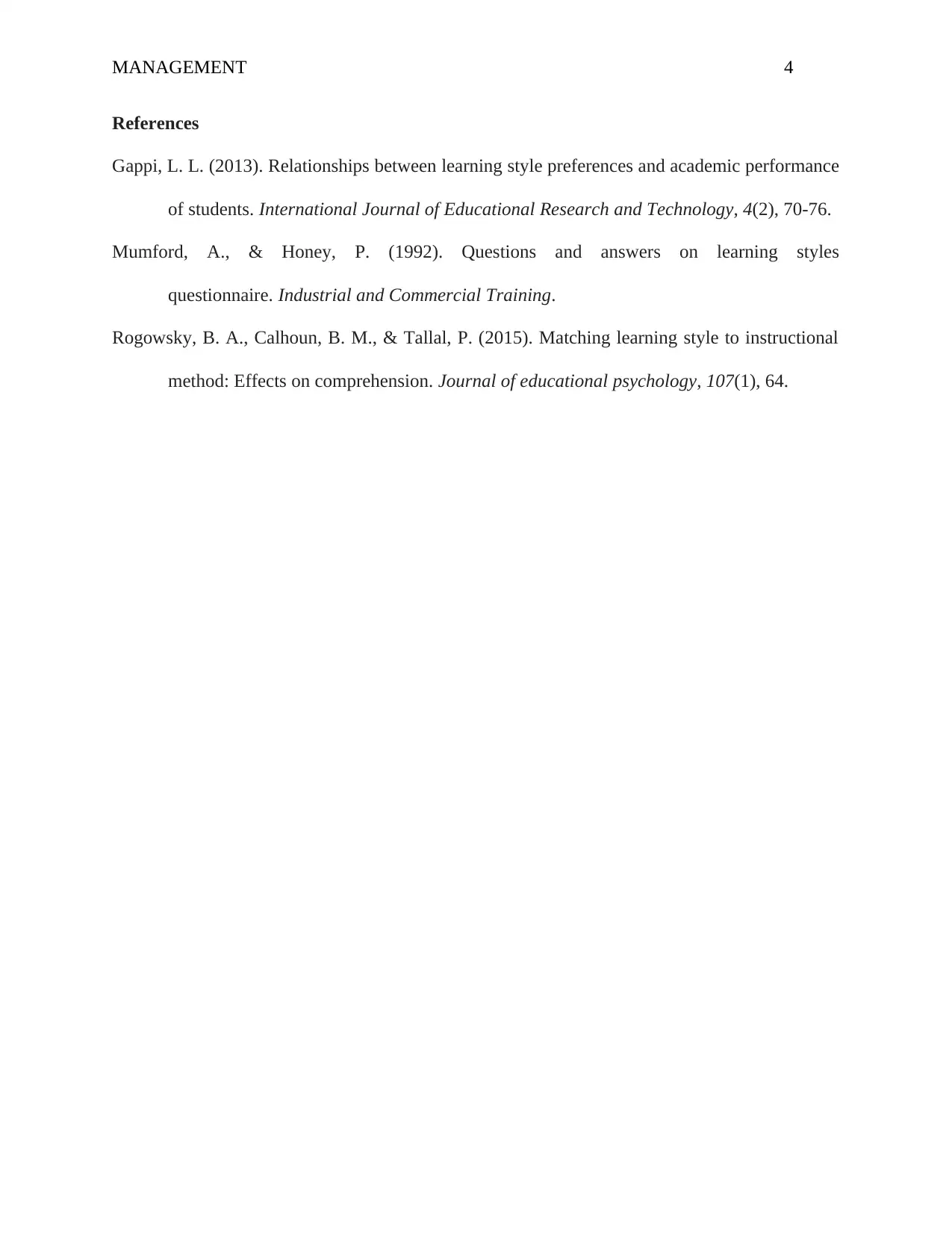
MANAGEMENT 4
References
Gappi, L. L. (2013). Relationships between learning style preferences and academic performance
of students. International Journal of Educational Research and Technology, 4(2), 70-76.
Mumford, A., & Honey, P. (1992). Questions and answers on learning styles
questionnaire. Industrial and Commercial Training.
Rogowsky, B. A., Calhoun, B. M., & Tallal, P. (2015). Matching learning style to instructional
method: Effects on comprehension. Journal of educational psychology, 107(1), 64.
References
Gappi, L. L. (2013). Relationships between learning style preferences and academic performance
of students. International Journal of Educational Research and Technology, 4(2), 70-76.
Mumford, A., & Honey, P. (1992). Questions and answers on learning styles
questionnaire. Industrial and Commercial Training.
Rogowsky, B. A., Calhoun, B. M., & Tallal, P. (2015). Matching learning style to instructional
method: Effects on comprehension. Journal of educational psychology, 107(1), 64.
1 out of 5
Related Documents
Your All-in-One AI-Powered Toolkit for Academic Success.
+13062052269
info@desklib.com
Available 24*7 on WhatsApp / Email
![[object Object]](/_next/static/media/star-bottom.7253800d.svg)
Unlock your academic potential
Copyright © 2020–2026 A2Z Services. All Rights Reserved. Developed and managed by ZUCOL.





